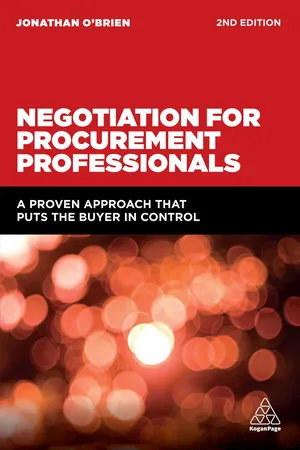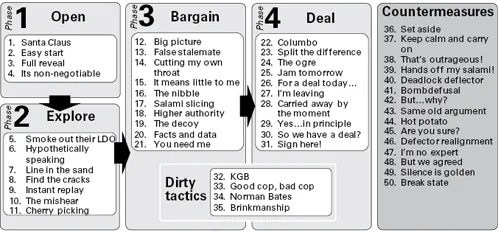
Negotiation for Procurement Professionals
A Proven Approach that Puts the Buyer in Control
- English
- ePUB (mobile friendly)
- Available on iOS & Android
Negotiation for Procurement Professionals
A Proven Approach that Puts the Buyer in Control
About this book
Highly effective negotiation skills are an essential element of a purchasing professional's toolkit. Negotiation for Procurement Professionals provides a step-by-step approach to delivering winning negotiations and getting game changing results. It provides purchasers with the necessary tools and tactics for a detailed, planned approach to negotiation.
Jonathan O'Brien shifts the emphasis away from relying mostly upon personality to a more structured approach that enables anyone to negotiate effectively, even when up against a formidable opponent. This approach allows the purchasing professional or the buying team to evaluate the supplier in advance, assess the sales team, and tailor their negotiation strategy depending on cultural differences, personality traits and game theory. Negotiation for Procurement Professionals provides a strong framework for discussion in advance of the meeting, allowing the negotiator to plan their agenda, objectives and tactics. Based upon Red Sheet Methodology, the book is a proven and collaborative technique used by many companies globally. If you are in a buying role, this book will increase your confidence and transform your ability to secure winning outcomes and better business results. Negotiation for Procurement Professionals is the perfect companion to Jonathan O'Brien's other books Category Management in Purchasing and Supplier Relationship Management. Used together, they provide a complete and powerful strategic purchasing toolkit.
Tools to learn more effectively

Saving Books

Keyword Search

Annotating Text

Listen to it instead
Information
11
Winning event tactics and techniques
Build your repertoire
Choosing the right tactic or technique
50 winning tactics

Opening tactics
Table of contents
- Cover
- Title Page
- Dedication
- Contents
- Preface
- Acknowledgements
- About the author
- Introduction
- 01 Introducing negotiation
- 02 Countering the seller’s advantage
- 03 Red Sheet – a winning process for negotiation
- 04 Planning the negotiation
- 05 Negotiating across cultures
- 06 Personality and negotiation
- 07 Power
- 08 Game theory in negotiation
- 09 Building the concession strategy
- 10 The negotiation event
- 11 Winning event tactics and techniques
- 12 Body language
- 13 Managing what you say and how you say it
- 14 Making it a success
- Appendix – The Red Sheet Negotiation Tool
- Glossary
- References and further reading
- Index
- Copyright
Frequently asked questions
- Essential is ideal for learners and professionals who enjoy exploring a wide range of subjects. Access the Essential Library with 800,000+ trusted titles and best-sellers across business, personal growth, and the humanities. Includes unlimited reading time and Standard Read Aloud voice.
- Complete: Perfect for advanced learners and researchers needing full, unrestricted access. Unlock 1.4M+ books across hundreds of subjects, including academic and specialized titles. The Complete Plan also includes advanced features like Premium Read Aloud and Research Assistant.
Please note we cannot support devices running on iOS 13 and Android 7 or earlier. Learn more about using the app